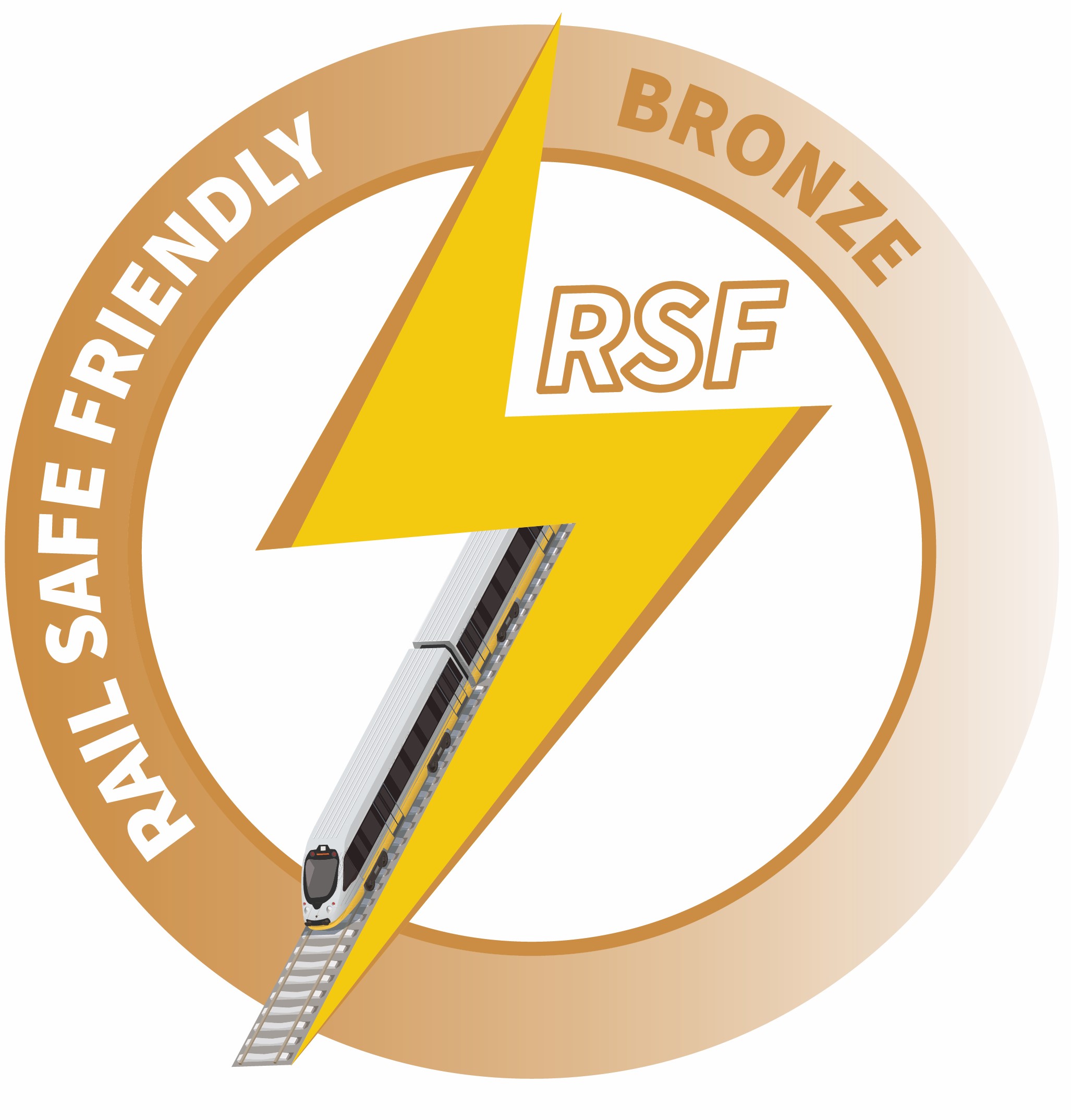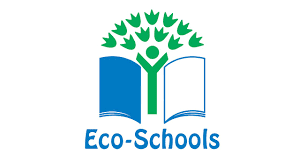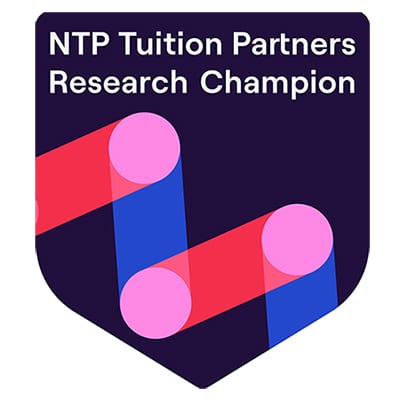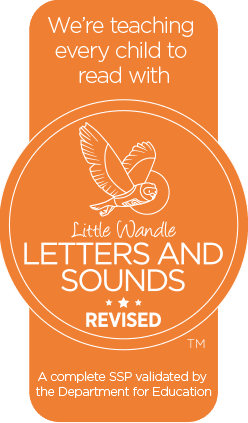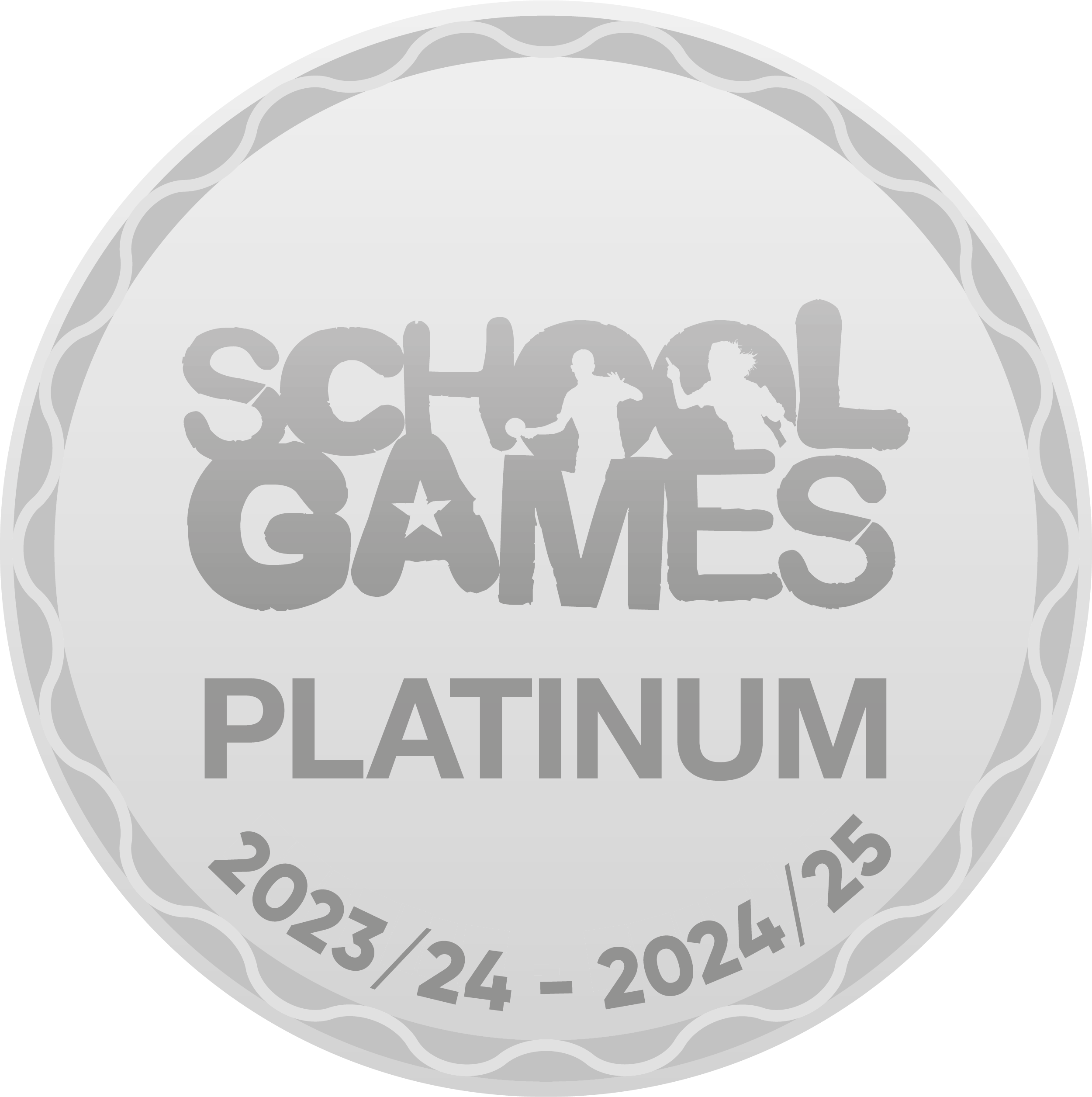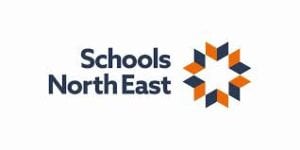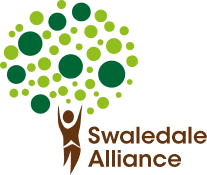At Applegarth, we believe that all children have the right to an effective education in the setting of their choice. We are here to support families and children by providing an inclusive learning environment that meets the needs of every pupil whether they have a specific need or not.
The arrangement for the admission of disabled pupils can be found on our School Admissions Page.
We foster a strong partnership between the school and wider community whereby any issues relating to SEND are brought to the attention of a teacher, the SENDCo or head teacher so that we can work together to find solutions. Carefully considered involvement of external professionals promotes progress for learners with SEND and provides a support network for families. All cases are treated with respect and confidentiality whilst taking the pupil and family’s views into account throughout.
Our School SENDCo (Special Educational Needs & Disabilities Co-ordinator) is Mr Steve Edwards. Our SEND Governor is Jill Pawluk.
You can also view our Inclusion Policy for more information.
SEND Information Report 2023-2024
What kinds of SEN are provided for in our school?
We welcome children with a broad range of needs to our school.
Special educational needs and provision falls under four broad areas:
- Communication and interaction
Cognition and learning
Social, mental and emotional health
Sensory and/or physical
Behavioural difficulties do not necessarily mean that a child or young person has SEN.
What policies do we have for identifying children and young people with SEN?
Please read our Inclusion Policy alongside this document, available on the school policies section of our website.
We use the “Assess, Plan, Do and Review” process, known as the Graduated Approach. (See the Appendix on our Inclusion Policy for more details.)
How do we assess their needs?
If you think your child may have SEN, we will observe closely, assess what may be causing the difficulties and share with you what we will do as a school to support you and your child. We talk to families and children regularly and liaise with other members of school staff.
We have a range of assessments which can be used within school to help identify the specific difficulties your child may be experiencing:
The Diagnostic Reading Analysis and/or Salford Reading and Comprehension Tests can help identify a difficulty with reading fluency, decoding or comprehension.
The Visual Assessment can help assess whether your child would benefit from the use of a coloured overlay to improve their reading.
Rising Stars NTS/GaPS tests can help to pinpoint areas of difficulty for some children
SNAP (Special Needs Assessment Profile) which can highlight specific learning and behavioural difficulties, and can generate a report that can be shared with parents/carers
The Boxall Profile Tool can assess social, emotional and behavioural difficulties
There are also assessments which we can ask you to support with to help identify the difficulties your child may be experiencing. These include:
The Neurodiversity Checklist
The Dyslexia and Dyscalculia Checklists
The Social Communication Checklist
The Social and Emotional Well-being Assessment
Some of these documents require that you complete a version, the pupil (where appropriate) completes a version and school (usually the class teacher) completes a version. The results are then collated and discussed with you.
What is the SENCo’s name and how can I contact them?
You can contact the SENCo in the following way:
Mr Steve Edwards (SENCo)
Telephone: 01609 773 521
Email: senco@applegarth.n-yorks.sch.uk
SEN Governor
Jill Pawluk
Telephone: 01609 773521
Email: admin@applegarth.n-yorks.sch.uk
What arrangements do we have for consulting with parents of children with SEN and involving them in their child’s education?
At Applegarth we take parental concerns seriously and we strive to build good relationships with all parents. We ask that in the first instance you make contact with the class teacher to discuss any concerns you may have surrounding either progress, or any other aspect of your child’s development. Mr Edwards (SENCO) works closely with all class teachers.
Communication with you about your child’s education includes the following as standard:
- Weekly newsletters
- Termly curriculum newsletters outlining the topic and providing details about the planned learning
- Letters to inform you if your child has been selected to take part in an intervention – this will explain why your child has been selected and offer you an opportunity to discuss further if required
- Twice yearly parent consultation evenings
- Annual school report
- Ongoing opportunities to speak to your child’s class teacher, SENCO or Headteacher as needed either by appointment or informally, for example before or after school
We recognise that as a parent of a child with SEN you may require additional communication between home and school to support your child’s learning and progress. This may include:
- Regular email contact
- Achievement books
- Home school communication books
Parents can be invited to attend relevant training opportunities provided by school or externally, for example on attachment, communication, sleep or through the Dyslexia Network.
Parents can also be signposted to relevant support networks e.g. SENDIASS, POSCH, and NYPACT. For more details, including support group details and impartial advice, see the NYCC Local Offer website: https://www.northyorks.gov.uk/send-local-offer or the SENDIASS website: http://sendiassnorthyorkshire.co.uk
What arrangements do we have in place to consult with young people with SEN and how do we involve them in their education?
The ethos within our school appreciates everyone’s uniqueness – that we all have our own strengths and weaknesses. Work carried out within classes, assemblies and when issues arise reinforce this ethos. The views of our children are listened to.
Visitors to the school frequently speak about how articulate our children are when they speak about what it is like to be a pupil at our school. This extends to children with SEN as well.
We run an active School and Eco Council who are involved in both school improvement and work within the local community. Pupils with SEND are consulted with about decisions and we aim to increase their representation as elected members in future. For example, they attend meetings at the town hall, create decorations for school fairs and generate questions to help with staff recruitment. We also have House Captains and Pupil Ambassadors.
Work with older children in particular includes a focus on aspirations and targeted pieces of work are carried out, for example visits to local Universities and inviting members of the local community in to talk about their jobs. Applegarth also participates in the Growing Up in North Yorkshire surveys.
Children with SEN may require additional support in articulating their views and aspirations. Targeted work may be undertaken with the class teacher, TA or learning mentor. Our learning mentor is trained in both Emotional Literacy (ELSA) and the Drawing and Talking therapeutic approach. Some children might find it difficult to express their views verbally; if this is the case then alternative methods are sought, for example by using visual prompts and traffic light cards.
Children with SEN are involved in setting and reviewing their own learning targets, as outlined on their individual provision maps. These documents are also shared and reviewed with you on a termly basis or more frequently if required. For those with EHCPs, pupil views are sought for annual reviews; these are maintained in order to track progress in the level of response as a child gets older.
What arrangements are in place for assessing and reviewing children and young people’s progress towards outcomes?
We use MARK (My Assessment and Reporting Kit – Rising Stars) and Insight to assess and track all pupil progress. For children not yet accessing the National Curriculum, we use pre-key stage standards for those engaged in subject-specific study and the Engagement Model for those who are not engaged in subject-specific study.
We meet termly with parents of children with SEND to hold review meetings and more often, informally, as required. This may be a conversation on the playground, or a message via text, telephone or email.We aim to make the review meetings as pleasant as possible, recognising that this can be a time that you can find difficult and stressful. We offer refreshments and ensure you are introduced to everyone who is present at the meeting. We try to ensure that we stick to time and ensure you have the chance to ask questions. You are welcome to complete parent views prior to the meeting to enable you to feel prepared and so that all points of concern can be addressed.
Pupil Provision Review documents can be used alongside Individual Provision Maps (IPMs) to highlight strategies which have worked (and their impact) and strategies which have not worked (and why they don’t work) for each child. IPMs are updated termly and shared with you. These documents form a very useful record for new teachers to quickly get up to speed with the particular needs of children with SEN so that learning time is not lost when a child moves into a new class.
Our school includes the following footer on all correspondence with parents to enable equality of access:
Your support for your child’s education is crucial to their progress. Please tell us if there are any adjustments we need to make to help you support your child, for example: letters in large font; letters in different languages; wheelchair access; explaining things over the phone; a discussion with a school colleague of the same gender.
What are the arrangements for supporting children and young people in moving between phases of education and in preparing for adulthood?
Transition between classes within school is carefully planned. Additional visits to see the new class and teacher are planned where needed. Where necessary, a transition book is provided for the summer holidays including photographs and information about the new class and topic. On some occasions, where necessary, a child has been invited into school on an INSET day at the beginning of a new term in order to have prior warning of changes that may have taken place to the building during the holiday period. At the end of each new school year, a staff meeting is held so that teachers can transfer information about individual SEND pupils to their new class teachers and discuss issues relating to that child. At the start of the year, during our professional development training day, all school staff are made aware of those children on the SEND register. This ensures that children start each year from day one in a supportive and understanding environment.
Transition to a new school is equally well planned. A member of staff from the relevant secondary school is always invited to Year 6 SEN reviews, and earlier if appropriate. We have a very good relationship with our main feeder secondary school Northallerton School and Sixth Form College and work closely with them to ensure that transition for all pupils, and especially those with SEN, is smooth and handled correctly in order to reduce anxiety for yourself and your child.
We tailor transition packages dependent on the needs and concerns of you and your child and it will always involve a discussion with you to decide together on the best approach.
Transition packages usually take the form of additional visits where children can familiarise themselves with the new site, but their format may be different dependent upon the pupil. For example, some children are introduced to a key member of staff and spend some time completing activities in a series of sessions before moving up to secondary school. Resources are provided to help support transition, for instance examples of what the timetable or school planner might look like. Targeted time is allocated by the learning mentor to support children who may be feeling anxious about transition.
Transition into Reception is also carefully considered. We communicate with local nurseries to ensure that any individual needs are flagged up early on. We carry out nursery visits and organise transition days. Where there are more complicated SEND needs, we aim to secure temporary funding in order to give these children a smooth transition and the best possible start.
As outlined above work is carried out surrounding employment and higher education (section 4).
What is our approach to teaching children and young people with SEN?
Applegarth is an inclusive school and we make every opportunity to include all children. We work closely with you and your child to aim to meet their needs in the best way possible. If your child requires an intervention to help them address a specific difficulty we will always inform you of this, usually via the Individual Provision map (IPM), and give you the opportunity to discuss with the class teacher.
Additional support can be provided during lessons to help children with SEN. This might take the form of additional or different resources, breaking a task down into smaller chunks, providing writing frames, visual supports and continued work using manipulatives. It might take the form of additional support from an adult within school (teacher or TA), which may include pre-teaching key information before a lesson so that the pupil is primed and ready, small group work or 1:1 support. Peer support may take place within a lesson, and/or between older and younger pupils. Our Whole School Provision Map outlines the range of strategies and interventions that we can draw on to ensure that individual needs of SEND pupils are met.
We always aim to include children with SEND on all educational visits, including residential visits.
For the children with more complex needs, a more personalised package of support may be required. For example, children may require sensory breaks in a quiet area (Rainbow Room), may need more access to the outdoor space or may need a more structured lunchtime. If a child with more complex needs requires more specialist support, we may seek to involve external agencies from a range of services available to us, including specialist teachers (from the SEND hub), educational psychologists or speech and language therapists. We would always discuss this with you and seek your written consent before involving such agencies.
Should a child continue to make limited progress, and the gap between him/her and their peers is continuing to widen, we would discuss with you the possibility of submitting an Education Health and Care Assessment Request. We would involve you fully in this process and you could also be supported in this process by the Special Educational Needs Information and Advice Support Services (SENDIASS), or by the Independent Supporters team. See the Inclusion Policy on our school website for more details.
What sort of adaptations are made to the curriculum and the learning environment of children and young people with SEN?
Adaptations are made wherever needed within the classroom, for example:
· changing the colours of interactive whiteboards
· providing a visual timetable in each class which is updated daily
· paired work or small group teaching
· providing coloured overlays
· chewellery (chewable jewellery)
· social stories
· different styles of reading books
· adaptations to homework and/or invitation to attend homework club
· use of ear defenders
· use of ICT to record ideas e.g. Clicker 8 (see also: Computing Policy)
· quiet areas within the classroom
· “chunking” learning into smaller sections
· writing scaffolds/frames/sentence starters
· use of practical resources
· access to our Rainbow Room and outside area including wildlife area
· opportunities to care for school animals
Further adaptations are detailed in our Whole School Provision Map.
Some children with a high level of need will also need a care plan or a health care plan, which may include a risk assessment.
What sort of expertise for supporting children and young people with SEN do we currently have in school?
The SENCo is fully NASENCO trained and accesses the termly NYCC Senco Network meetings and Beacon Partnership Group meetings.
One of our teachers is also currently working through the NASENCO training.
Two of our TAs are ELSA trained and so are well placed to support children with social and emotional difficulties.
TAs have also received training in a range of other intervention packages that address aspects of the four areas of need (see number 1 above). These include intervention programmes such as ELS, FLS, 1stClass@Number, Success@Arithmetic, Drawing and Talking, Precision Teaching, Lego Therapy, Talk Boost and NELI. Interventions are listed on the Whole School Provision Map.
A rolling programme of up-to-date staff training (for both teachers and TAs) is in place, which covers specific areas of needs such as ADHD or ASD, as well as school-specific procedural updates. Training is delivered either in-house or through external providers such as educational psychologists or specialist teachers. In addition to the long-term CPD rolling programme, specific training is provided for individual staff members as and when the need arises.
Should we require additional support or expertise to meet a child’s needs, and once it has been proven that we are unable to meet this within school, a request for involvement would be made to the North Yorkshire SEND hub.
Where personalised packages are required, both class teachers and TAs are fully involved with the specialist expertise from NYCC hub teams in supporting the child. Parents and children are also involved in the process at all stages.
How do we evaluate the effectiveness of the provision made for children and young people with SEN?
As outlined in other sections, we carefully monitor and track progress of children using MARK, pre-key stage standards or the Engagement Model (see section 5 above). We also use individual provision maps (IPMs), which are reviewed termly with parents and pupils, leading to new targets being set. We have high expectations for our SEND pupils and so do not necessarily wait until the review to update targets; we use Target Record Sheets to move our children on swiftly throughout each term. We record details of interventions undertaken on the IPMs.
Observations (in class, in small groups and during 1:1 sessions), work scrutiny and pupil conferencing all form part of evaluating the effectiveness of provision, as well as feedback from you as parents. We recognise that work scrutiny provides a valuable measure of progress over time.
Specific intervention programmes use a tight measure of progress. These are carried out as per the recommendations accompanying each package.
Assessments help the teacher, pupil and parent to be aware of any specific areas of difficulty and they provide a baseline against which to measure progress. Where packages have an integral parent feedback system, the certificates/postcards are used to celebrate sometimes the smallest of steps. These are celebrated in assemblies and form another communication link with for parents.
How are children and young people with SEN enabled to engage in activities available with children and young people in the school who do not have SEN?
We provide a wide range of opportunities for all of our children, irrespective of gender, ethnicity, SEN or disability, to engage in activities. We record attendance of SEND pupils for all extra-curricular activities in order to highlight areas where encouragement may be needed. We promote SEND representation in high profile roles such as school council.
Medium term plans in all subject areas specifically reference SEN provision and subject leaders monitor engagement using the Education Endowment Foundation (EFF) ‘5-a-day’ checklist.
Other opportunities are outlined in Section 4.
How do we support children and young people with SEN to improve their emotional and social development?
Regular Jigsaw (PSHE) lessons provide a consistent and differentiated approach to PSHE across the whole school, and the PSHE subject leader ensures that staff are aware of the need for SEND provision in this area.
We have a learning mentor who has been trained in a wide range of interventions that can provide for children with social, emotional and mental health needs (see section 9).
Our initial professional development training day at the start of the year ensures that all staff are aware of the SEND pupils in school, and they are encouraged to interact with them during the course of the school day if opportunities arise (e.g. at dinner time or on the playground).
We use a whole school tracking system (CPOMs) to record, track and find patterns with any bullying incidents that might occur. We are acutely aware that pupils with SEND are more vulnerable in terms of bullying and safeguarding. Actions are immediately put into place to prevent escalation.
We hold an annual ‘Neurodiversity Week’ event to raise awareness of a wide range of needs.
In addition, targeted work is carried out by class teachers, TAs and the learning mentor as needs arise.
How do we involve other bodies, including health and social care bodies, local authority support services and voluntary sector organisations, in meeting children and young people’s SEN and supporting their families?
We work closely with a range of external agencies to help meet your child’s needs. This includes the Early Help Service (which has a team of family outreach workers who can support you at home), the Hub teams, the Healthy Child Practitioner team, educational psychologists and speech and language therapy services.
If we feel that we require some additional support to meet your child’s needs, we will always speak to you first and seek your written consent.
What are the arrangements for handling complaints from parents of children with SEN about the provision made?
Complaints about SEN follow the general complaints procedure. Please see your child’s class teacher in the first instance, to see if your concerns can be immediately addressed.
Should there be no improvement, please do make an appointment to see either Mr Peoples (Headteacher), Mrs Hopkin (Deputy Headteacher) or Mr Edwards (SENCO).
If you still feel that your view has not been listened to or answered to your satisfaction you can make a formal complaint by writing to Mrs Diane Parsons (chair of governors) at the school.
SEN Governor – Jill Pawluk
T – 01609 773521
E – admin@applegarth.n-yorks.sch.uk
Chair of Governors – Rev Claire Soderman
T – 01609 773521
E – cofg@applegarth.n-yorks.sch.uk
Download a copy of our SEN information Report.
You can download a copy of our SEN information Report (including Appendix 1) by clicking the link below:
Adobe Reader
You may need a product like Adobe Reader (free download) to view our PDF documents on our website.
Adaptive Teaching for Pupils with SEND
Our teachers and support staff are highly-skilled SEND leaders. They follow structured, evidence-based principles in order to maximise progress for pupils with SEND (and those with no additional needs too) in all areas of the curriculum. Subject leaders monitor the effectiveness and impact of teaching and learning for pupils with SEND using this framework. The Five-a-day Principle links closely with Rosenshine’s Principles which are applied to all subjects and for all pupils.
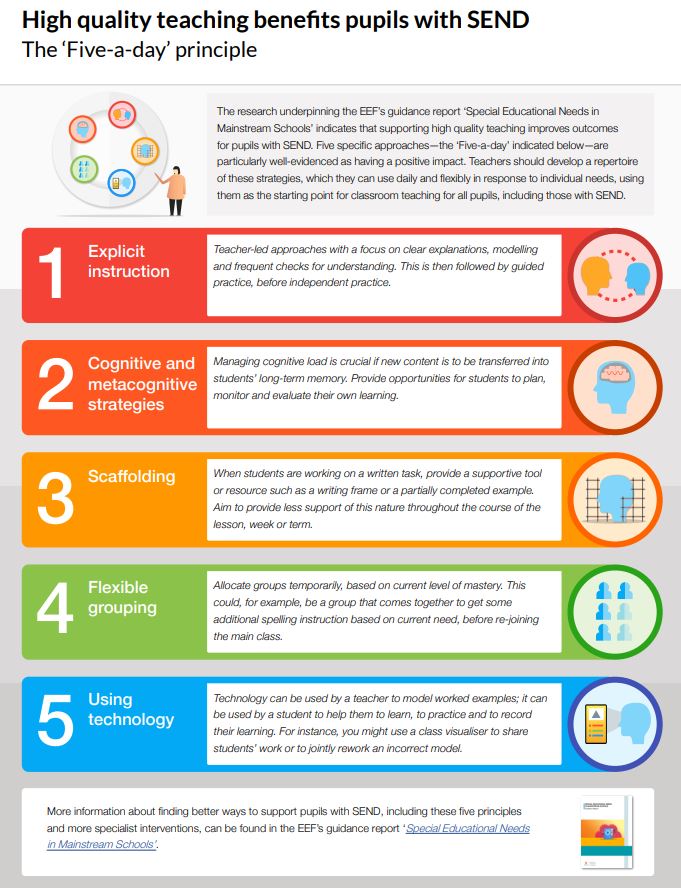
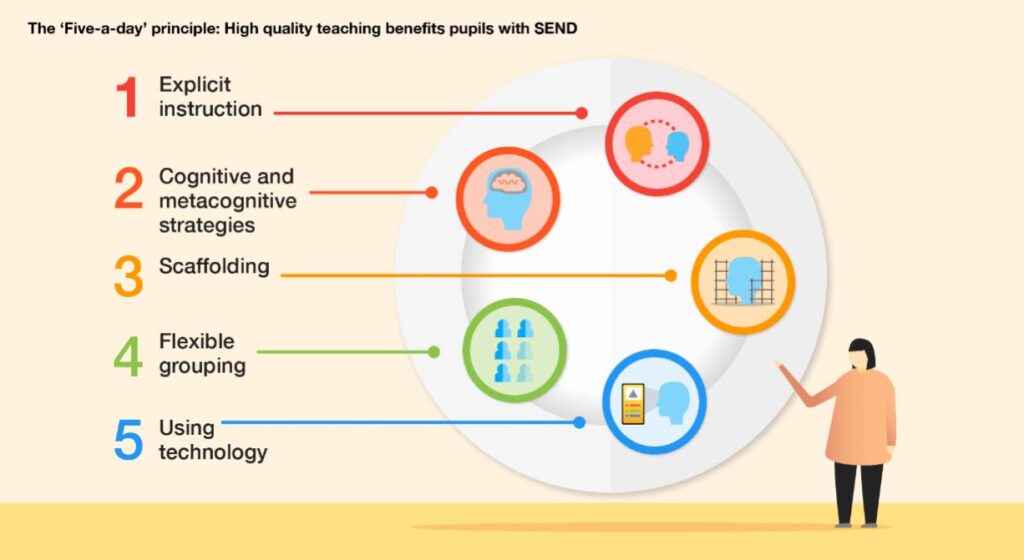
Whole School Provision Map
Our SENDCo has collaborated with leaders, teachers and support staff to produce a whole school provision map which is a comprehensive (and ever-evolving) reference resource to support staff in accessing prompt intervention and target setting for pupils with SEND as well as identifying pathways for cases where At a Glance (AAG) and Individual Provision Maps (IPMs) have not had the desired impact.
If you would like to discuss your child’s SEND requirements in more detail please contact the school to arrange an appointment.
SEND Local Offer
The local offer provides useful information for children and young people with special educational needs and disabilities (SEND) and their families. It is here to help families, individuals, groups and organisations find information, so you have more choice and control over what support is right.
Adobe Reader
You may need a product like Adobe Reader (free download) to view our PDF documents on our website.

